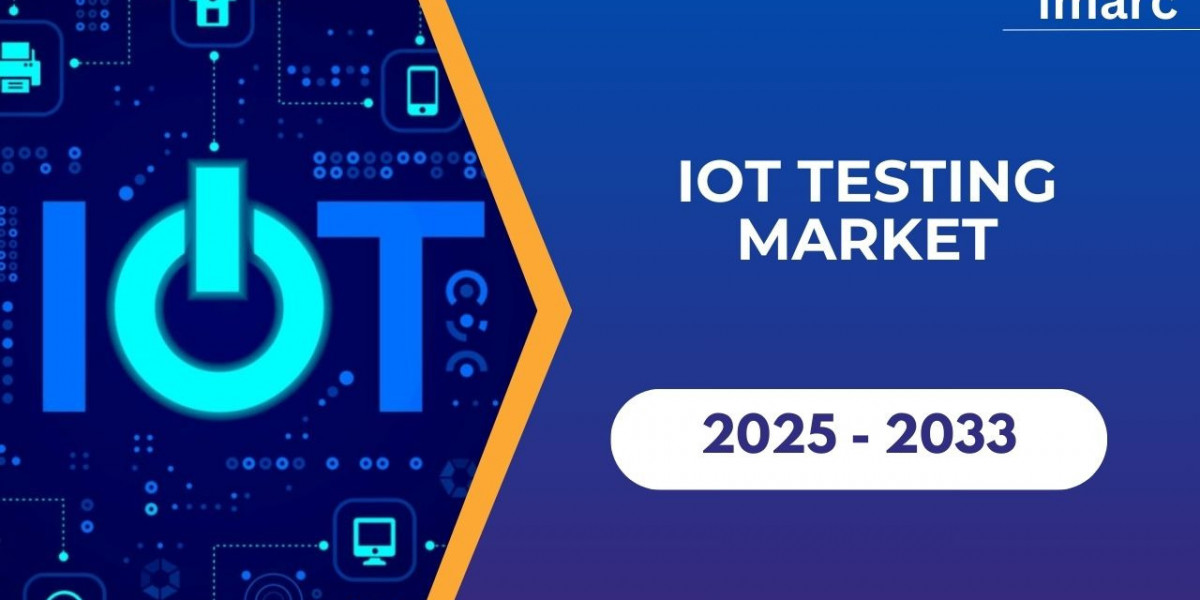The global IoT testing market is witnessing significant growth, propelled by the increasing adoption of IoT devices across various industries. As of 2024, the market size reached USD 3.8 billion and is projected to escalate to USD 42.2 billion by 2033, exhibiting a robust CAGR of 29.29% during 2025–2033. This surge is attributed to factors such as the growing digitization of business operations, heightened concerns about cybersecurity breaches, and a rising emphasis on early defect detection to reduce post-deployment costs.
Study Assumption Years
- Base Year: 2024
- Historical Years: 2019–2024
- Forecast Years: 2025–2033
IoT Testing Market Key Takeaways
- Market Size & Growth: The IoT testing market is expected to grow from USD 3.8 billion in 2024 to USD 42.2 billion by 2033, at a CAGR of 29.29%.
- Regional Dominance: North America leads the market, driven by advanced technological infrastructure and early adoption of IoT solutions.
- Testing Type Leader: Network testing holds the largest market share, ensuring compliance with industry standards and reliable device communication.
- Service Type Segmentation: The market is segmented into managed services and professional services, catering to diverse organizational needs.
- Deployment Modes: Organizations opt for either on-premises or cloud-based deployment, depending on their operational requirements.
- Application Areas: IoT testing is crucial in smart buildings, capillary network management, smart utilities, vehicle telematics, smart manufacturing, and smart healthcare.
- Growth Drivers: Key factors include the proliferation of IoT devices, emphasis on security and data privacy, and the need for interoperability and standardization.
What Are the Key Factors Fueling the IoT Testing Market Growth?
Proliferation of IoT Devices Across Industries
The rapid expansion of IoT devices across various sectors such as smart homes, industrial automation, healthcare, and transportation is a primary driver of the IoT testing market. As businesses increasingly adopt IoT technology, the number of connected devices rises, necessitating rigorous testing to ensure functionality, security, and interoperability. Comprehensive IoT testing solutions are essential to validate that devices perform as intended under various conditions and integrate seamlessly with existing systems.
Emphasis on Security and Data Privacy
With IoT devices collecting and transmitting vast amounts of sensitive data, the risk of cyber threats and data breaches escalates. Organizations are becoming increasingly aware of the vulnerabilities associated with connected devices and the potential consequences of security lapses. Consequently, thorough testing for security vulnerabilities and data protection measures is essential. IoT testing services now encompass security assessments, penetration testing, and compliance checks to ensure that devices are fortified against cyber threats, thereby protecting consumer data and maintaining organizational reputations.
Growing Demand for Interoperability and Standardization
The need for interoperability and standardization among IoT devices significantly contributes to the growth of the IoT testing market. As the IoT ecosystem comprises diverse devices and platforms, ensuring seamless communication and integration becomes crucial. IoT testing plays a vital role in verifying that devices from different manufacturers can work together efficiently, adhere to industry standards, and provide a consistent user experience. This demand for interoperability drives the development and implementation of comprehensive testing protocols and standards.
Market Segmentation
Breakup by Testing Type:
- Functional Testing: Ensures that IoT devices perform their intended functions correctly under various conditions.
- Performance Testing: Evaluates the responsiveness, stability, scalability, and speed of IoT devices and applications.
- Network Testing: Assesses the reliability and performance of networks connecting IoT devices, ensuring seamless data transmission.
- Compatibility Testing: Verifies that IoT devices can operate across different devices, operating systems, and network environments.
- Usability Testing: Focuses on the user-friendliness and intuitive interaction of IoT devices for end-users.
- Security Testing: Identifies vulnerabilities and ensures that IoT devices are protected against potential security threats.
Breakup by Service Type:
- Managed Services: Outsourced services that handle the deployment, monitoring, and maintenance of IoT testing processes.
- Professional Services: Specialized services offering expertise in planning, implementing, and optimizing IoT testing strategies.
Breakup by Deployment Mode:
- On-premises: IoT testing solutions deployed within an organization's infrastructure, offering greater control and security.
- Cloud-based: IoT testing services hosted on cloud platforms, providing scalability and remote accessibility.
Breakup by Application:
- Smart Building and Home Automation: Testing ensures the reliable operation of interconnected devices in smart homes and buildings.
- Capillary Network Management: Focuses on testing the networks that connect numerous small, low-power devices in IoT ecosystems.
- Smart Utilities: Ensures the efficient functioning of IoT devices in utility services like water, electricity, and gas.
- Vehicle Telematics: Testing the communication systems in vehicles that collect and transmit data for monitoring and diagnostics.
- Smart Manufacturing: Validates the performance and integration of IoT devices in manufacturing processes for automation and monitoring.
- Smart Healthcare: Ensures the reliability and security of IoT devices used in healthcare settings for patient monitoring and data collection.
Breakup by Region:
- North America (United States, Canada)
- Asia Pacific (China, Japan, India, South Korea, Australia, Indonesia, Others)
- Europe (Germany, France, United Kingdom, Italy, Spain, Russia, Others)
- Latin America (Brazil, Mexico, Others)
- Middle East and Africa
Which Region Is Leading the IoT Testing Market?
North America currently dominates the global IoT testing market, primarily due to its advanced technological infrastructure, early adoption of IoT solutions, and stringent regulatory standards. The region's focus on innovation and the presence of key market players contribute to its leading position.
What Are the Latest Developments in the IoT Testing Market?
The IoT testing market is experiencing rapid advancements, with a focus on enhancing security, performance, and interoperability of IoT devices. Recent developments include the integration of artificial intelligence and machine learning in testing processes, enabling predictive analytics and automated issue detection. Additionally, the adoption of edge computing necessitates specialized testing to ensure seamless functionality at the network's edge. Collaborations among key players are also fostering innovation, leading to the development of comprehensive testing frameworks that address the evolving complexities of IoT ecosystems.
Who Are the Key Players in the IoT Testing Market?
AFour Technologies Pvt. Ltd., Apica AB, Beyond Security (HelpSystems LLC), Capgemini SE, Happiest Minds Technologies Limited, HCL Technologies Limited, Infosys Limited, Keysight Technologies, Praetorian, Rapid7 Inc., Saksoft Limited, Singapore Telecommunications Limited, etc.
Frequently Asked Questions (FAQs)
Q1: What is IoT testing, and why is it important?
IoT testing involves evaluating IoT devices and systems to ensure they function correctly, securely, and efficiently. It's crucial for identifying and fixing issues before deployment, ensuring reliability and user satisfaction.
Q2: Which industries benefit most from IoT testing?
Industries such as healthcare, manufacturing, automotive, utilities, and smart homes significantly benefit from IoT testing by ensuring their connected devices operate seamlessly and securely.
Q3: What are the common types of IoT testing?
Common types include functional testing, performance testing, network testing, compatibility testing, usability testing, and security testing, each focusing on different aspects of device and system validation.
Q4: How does IoT testing address security concerns?
IoT testing identifies vulnerabilities and ensures that devices have robust security measures, protecting against potential cyber threats and data breaches.
If you require any specific information that is not currently covered within the scope of the report, we will provide the same as a part of the customization.
About Us:
IMARC Group is a global management consulting firm that helps the world’s most changemakers to create a lasting impact. The company provides a comprehensive suite of market entry and expansion services. IMARC offerings include thorough market assessment, considerations studies, company incorporation assistance, factory setup support, regulatory approvals and licensing navigation, branding, marketing and sales strategies, competitive landscape and benchmarking analyzes, pricing and cost research, and procurement research.










